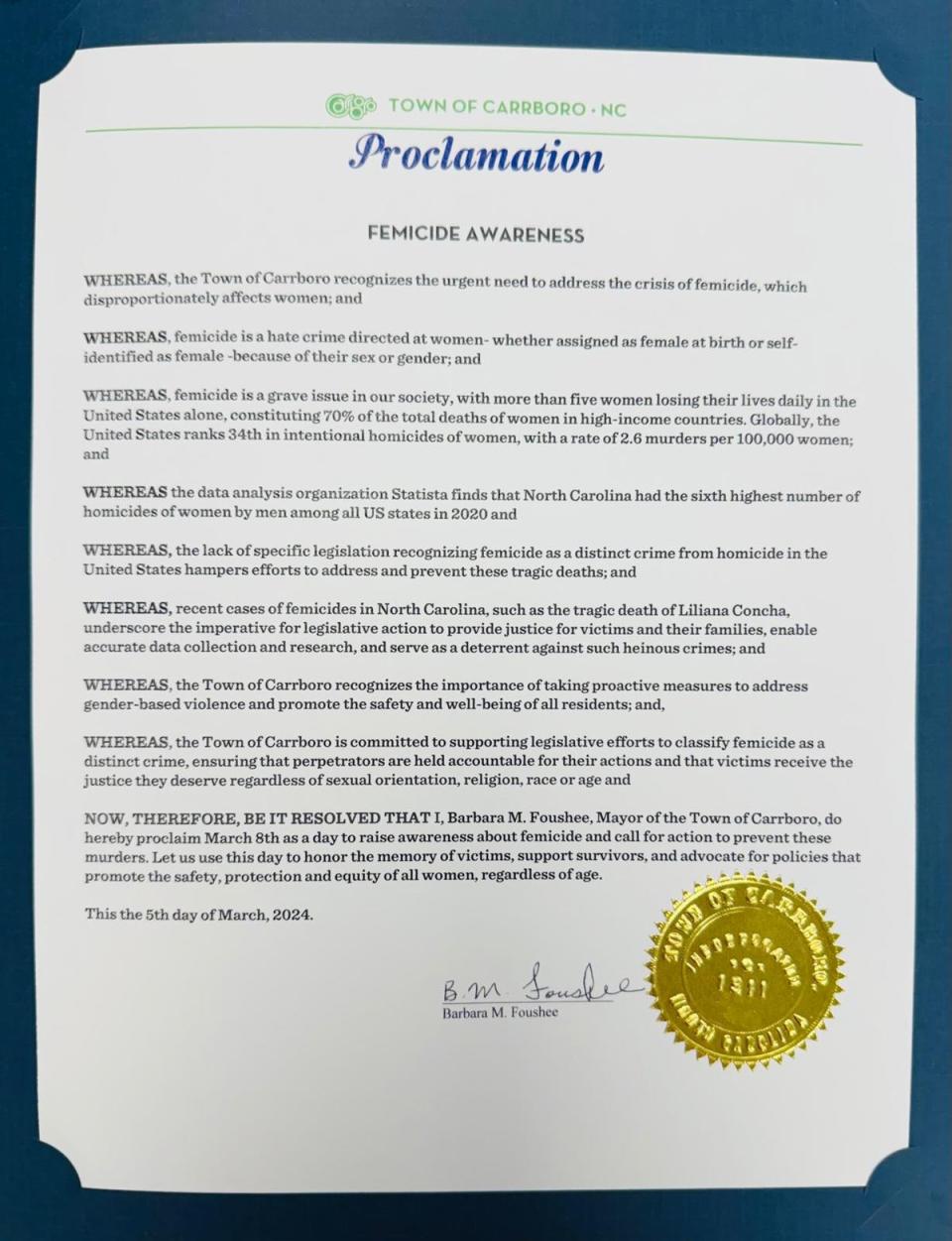Three years ago, a North Carolina State University student was found dead in her home. Just last month, her killer was convicted and sentenced to life in prison.
That man was her partner. Erick Gael Hernandez-Mendez was someone Christina Matos trusted and loved, she’d even been helping with his citizenship application.
Five days after he became a US citizen, he killed Christina.
“She wanted to help him because he was a kind man – well, that’s the facade he put up for her,” her brother Abraham Matos told The Independent.
“After he got what he wanted – after only five days – he stabs her to death over 16 times.”
Mr Matos and their mother Yolanda Matos are still reeling from the loss of Christina and have since become aware of the growing epidemic across North Carolina and the rest of the country: femicide.

Femicide is the gender-related killing of women and girls, usually by a current or former romantic partner. The terms “femicide” and “homicide” both describe the intentional killing of another person, but they are not synonymous.
In 2023, El Centro Hispano conducted research that found 51 North Carolina women were victims of femicide that year alone.
“Femicide … is the most severe and extreme manifestation of the continued attacks on women and girls, because of gender roles, inequity between men and women, discrimination and the existence of harmful social norms,” said Pilar Rocha-Goldberg, the executive director of El Centro Hispano, a local organization in North Carolina helping the Latino community across Durham, Wake, Orange, and neighboring counties.
“We can never know who is going to kill who. If I knew, I obviously would’ve warned her,” Mr Mato said about his sister. “You gotta look for the signs. It’s always the ones you trust, it’s always the ones close to you. It’s the ones you think would never hurt you.”
Now 2024 is expected to surpass last year – with 13 homicides of women in North Carolina by partners during January and February alone. Between 1 March and 16 April, the most recent data available, another 13 women were killed, according to the North Carolina Coalition Against Domestic Violence.
El Centro Hispano is trying to change this.
Gender-based violence is a longstanding issue in Latin America. Chile and Brazil classify femicide as a crime, while people in other countries across Latin America and Europe have protested to demand laws to establish it as an offense, according to El Centro Hispano.
On 8 March – International Women’s Day, the group called on Governor Roy Cooper and Attorney General Josh Stein to support making femicide a crime separate from homicide.
This would make the killing of women in North Carolina a specific criminal offense with more severe sentences.
“Sadly, we are seeing more and more cases every day,” said Ms Rocha-Goldberg from El Centro Hispano. “Some of these cases are close to our heart.”
Earlier this year, North Carolina real estate agent Liliana Concha Pérez, 55, was found dead in her Durham office. She’d been killed by her former boyfriend, who was described by her brother as jealous, possessive and obsessive. After he’d killed Concha Pérez, he died by suicide next to her.
Within a few weeks, at least five more domestic-related murders — leaving five more women and one girl dead — followed, according to research by El Centro Hispano.

On 15 January 2024, Gabrielle Raymond, 37, and Nancy Taylor, 69, were allegedly shot to death along with their dog in Apex, by their neighbor, a former Army captain.
A week later, Kaylinn Cave, a 12-year-old girl, was allegedly murdered by her father in Yadkin County.
On 24 January, María Teresa Meraz-Cruz was killed allegedly by her boyfriend, Miguel Angel Ventura, in Benson, North Carolina, in a murder-suicide following an argument.
On 1 February, Nataly Martínez, 20, a single mother of two girls, died at the hands of her partner in Charlotte.
On 7 February, police arrested Tammy Lynn Hodges’s husband after she was found dead inside her home.
“When does it end? We want us alive.” asked Ms Rocha-Goldberg, who knew Liliana and her partner who killed her. Both were members of the group’s board.
Liliana was well-known in the community as someone who helped countless Latinx immigrants navigate the path to homeownership.
“There is a lot of hurt in our community after Liliana’s death,” Ms Rocha-Goldberg said. “We need to make sure this doesn’t keep happening.”
She helped him get his citizenship. Five days later, he killed her
On 3 April 2021, Christina Matos was murdered in her apartment in Raleigh, North Carolina. She had just turned 20 years old a few days earlier.
Her body was discovered inside her locked bedroom after her mother and brother went to check on her. An autopsy revealed she had been stabbed at least 16 times. A trail of blood led from her room to her former partner’s room.
Christina’s former partner, Erick Gael Hernandez-Mendez, who was born in Mexico, testified at his trial earlier this year that their marriage was a “sham” to obtain his U.S. citizenship and that he had agreed to pay her $15,000 for the favour.
Hernandez-Mendez told jurors that he witnessed her roommate, Kailey Lynch-Firicano, stab Christina to death, claiming the women had a fight over the temperature in the apartment days earlier.
“They were on their knees like this,” he described to the courtroom. “She was coughing and gurgling with blood coming out … I stayed with her ‘til her last breath, and I said I will go get help … and Christina said ‘no, let me die.’”
Prosecutors argued that Hernandez-Mendez placed the blame on Ms Lynch-Firicano only after she was arrested and charged with felony accessory after the fact to murder and obstructing justice – which was two years after the murder.
Prosecutors also said that Hernandez-Mendez had not paid Christina in full, and was annoyed that she had moved on to be with other men, leading him to not trust her, and ultimately led to a motive.
They also argued that Hernandez-Mendez had conducted an Internet search asking “What happens if my U.S. citizen wife dies?”
In the end, after only three hours of deliberation, a jury found Hernandez-Mendez guilty of murder and sentenced him to life in prison.
“You are a wolf in sheep’s clothing,” Christina’s brother Abraham told the defendant in a victim impact statement, “You are the worst person to encounter, to use people like tools and throw them out when you break them.”
Christina’s mom read her statement through her tears.
“I cannot call you animal, because sometimes an animal has compassion,” Ms Matos told Hernandez-Mendez. “Look at what you did to her! Look at what you did to my family! Look at what you did to me!”
Ms Lynch-Firicano, the other former roommate, will face trial next month.
Christina’s family says they plan on being there for further justice, despite knowing that nothing will bring back Christina.
“It’s hard, very hard,” her heartbroken mother told The Independent through her tears. “He stole her life, for what? She no deserve, no woman deserve this.”
Ms Matos said it’s time for the government to step in.
“Everyday cry, everyday suffer. It’s not fair,” she said. “I know other mothers do the same. So what now? We can help this not happen again. So other mothers no feel the pain. The pain I feel… It’s hard. It never goes away.”
Women are dying of femicide at a startling rate – what can be done?
In April, the Population Institute, a nonprofit which advocates for gender equality and sexual and reproductive health, released a report on widespread harmful gender-based practices in the US, including female genital mutilation/cutting (FGM/C), child marriage, and femicide.
According to the new report, the US has one of the highest rates of femicide among high-income countries, 2.2 per 100,000 women. Women in the US are 28 times more likely to be intentionally murdered by guns than women in peer countries.
The lack of a legal differentiation between femicide and homicide makes it very difficult to gather accurate data about femicide, according to El Centro Hispano.
The group says they are doing all they can, but do not have the adequate funding and have started a petition calling on Governor Roy Cooper, Attorney General Josh Stein, and other lawmakers to pursue classifying femicide as a crime in North Carolina.
Classifying femicide as its own crime could encourage government funding toward such programs, they said.
However, classifying femicide as a crime does little good if those who are most at risk have difficulty accessing the legal protections a separate classification would provide.
Joanna Kelley, an attorney who has represented the families of female homicide victims, including the family of Liliana, told The Independent thatassault on a female is already a specific charge in NC General Statutes, and that North Carolina could be the first state in the US to make femicide a crime.
Designating such killings as a specific crime in the state “means we understand that our society is changing; there are new needs and therefore, we must adapt,” Ms Kelley said.
But Ms Kelley added that one of the roadblocks they face is that the issue has become political, instead about the victims and their families.
“This is not about being Democrat orRrepublican – this is not about being a feminist, we care about men too, and domestic violence happens to both,” she said. “We care about the people. That’s who the focus should be on. And that’s why a change needs to happen.”
The Independent has reached out to local lawmakers, including Senator Thom Tillis for comment. Mr Tillis’ office had previously promised to pay for the transport of Liliana’s mother from Colombia to the United States for her funeral.
Ms Kelley confirmed to The Independent that Liliana’s mother was able to travel to the US and attend her daughter’s funeral.
Liliana’s friend and colleague at El Centro Hispano, Ms Rocha-Goldberg, said she believes the recent murders, including Liliana’s, highlight the pressing need for legislative action.
In the petition, the organization lays out compelling reasons to establish femicide as a crime, including recognizing the gendered nature of violence, providing justice for victims and their families, enabling accurate data collection and research, and serving as a deterrent.

But as of May, the government has not taken any steps to address femicides.
“We won’t give up. We’ll continue to raise our voices,” Ms Rocha-Goldberg said. “How many more women will be hurt, how many killed, before something is done? It needs to end now.”
Meanwhile, Mr Matos hopes by sharing his sister’s story, it will help other women.
“I refer to him as the boogeyman under my bed,” Mr Matos said about the man their family trusted because he was someone Christina trusted.
“And I’m keeping him under my bed. I’m moving forward. I’m keeping Christina in my heart. My mom and I are moving forward – and what better way than to share Christina’s story to help spread awareness.”
If you or someone you know is in danger of intimate partner violence, reach out to the National Domestic Violence Hotline at 800-799-7233.
